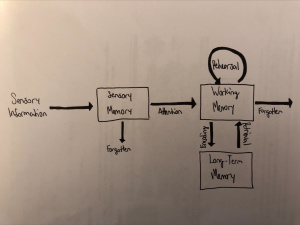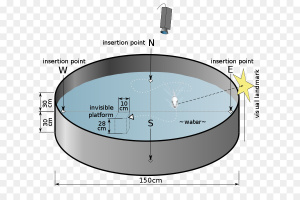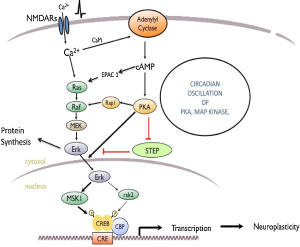How is Memory Consolidated?
In 1900, the idea that memories require time to become resistant to disruption was proposed: the consolidation hypothesis. In order for sensory information to become a stable memory, there are three stages of memory in which this information must pass through:
- Sensory Memory (SM) – very brief memory storage that holds impressions of recent sensory information
- Holds information for 1 second or less
- Working Memory (WM) – storage that allows an individual to recall and manipulate information for a short period of time
- Holds information for 30 seconds or less
- Long-Term Memory (LTM) – storage of various memories and experiences
- Holds information older than 30 seconds

The underlying mechanisms of memory consolidation include protein synthesis necessary for long-term potentiation (LTP). LTP is a process in which synapses between neurons are persistently strengthened through repeated activation that produces enduring signal transmission. LTP is a form of synaptic plasticity, which is simply a change at neuronal synapses (junctions). The synthesis of proteins is necessary for the construction of large, stable, actin cytoskeletons (spines) that promote endurance of LTP. In order to induce LTP and protein synthesis, Ca2+ influx through glutamate binding to NMDA receptor channels and voltage-gated Ca2+ channels is necessary. Also, intracellular stores of Ca2+ from the endoplasmic reticulum (ER) may be released through ryanodine receptors (RyR) or IP3R Ca2+ binding. Then, protein synthesis may either occur locally (within the dendritic spine), or may result from genomic cascades (synapse/soma to nucleus). Local protein translation begins when a dendritic spine become stimulated and increases translation of specific proteins used to synthesize proteins necessary for LTP. In order for this protein synthesis to occur, activation of signaling pathways such as MAPK or mTOR, each activated by the BDNF-TrkB pathway, is necessary (Rudy, 2008).
Impacts of Sleep on Memory Consolidation

There are many studies that feature the benefits of sleep on memory consolidation. The neural connections necessary for memory stability have shown to be strengthened by sleep. While many researchers had initially stressed the importance of REM sleep for memory stability, many have shifted focus to non-REM (NREM), specifically slow-wave-sleep (SWS) (Cross et al., 2018). SWS has been shown to be heavily involved in the enhancement of declarative memories (facts and knowledge). Alternatively, REM sleep has been shown to improve consolidation of procedural memory (tasks). In animal models, deprivation of REM sleep following training in the Morris water maze (a rodent memory task) interfered with spatial learning and memory. It has also been shown that learning produces an increase in REM sleep. Interestingly, the onset and duration of REM sleep varies with task complexity (Xia and Storm, 2017).
Cellular Mechanisms
Although the underlying mechanisms of memory consolidation and sleep do not appear to be well-studied, certain researchers have begun to untangle some of its mystery. As stated earlier, Ca2+ release and activation of MAPK and mTOR signaling pathways is necessary for protein synthesis and the endurance of LTP. According to Xia and Storm (2017), Ca2+ influx through NMDA receptors activates CaM and the Ras/Raf/MEK/Erk signaling pathway (MAPK pathway).

The activation of CaM then activates adenylyl cyclase which promotes cAMP signaling to activate the MAPK signaling pathway as well. Upregulation of the MAPK signaling pathway positively regulates CRE-mediated transcription and protein synthesis necessary for LTP and subsequent memory formation. This signaling pathway maintains memory through circadian oscillations within the hippocampus during REM and SWS sleep, possibly reaching its maximum in REM sleep (Xia and Storm, 2017).
Sleep Deprivation (or Excessive Sleep)
Sleep deprivation has been shown to increase difficulty in memory retrieval and consolidation. It is likely that when one is sleep deprived (not getting enough REM or SWS sleep) the necessary signaling pathways are not being activated to promote protein synthesis and LTP. Also, many studies have hypothesized the idea of “overworked” neurons that are no longer able to function properly and retain necessary information. Due to this, it becomes much more difficult to access information learned previously. Conversely, similar symptoms may also be seen through excessive sleep. According to Ma et al. (2020), there is an inverted U-shape correlation between sleep duration and cognitive decline. This implies that too much or too little sleep can produce declines in cognitive ability, while intermediate sleep is necessary for optimal performance (Ma et al., 2020). Sleep recommendations for college students between the ages of 18 and 25 is 7-9 hours of sleep per night. In regard to learning and memory, sleep has been shown to be an essential biological process to promote health in the human brain and body.
References
Cross, Z. R., Kohler, M. J., Schlesewsky, M., Gaskell, M. G., & Bornkessel-Schlesewsky, I. (2018). Sleep-dependent memory consolidation and incremental sentence comprehension: Computational dependencies during language learning as revealed by neuronal oscillations. Frontiers in Human Neuroscience, 12. https://doi.org/10.3389/fnhum.2018.00018
Ma, Y., Liang, L., Zheng, F., Shi, L., Zhong, B., & Xie, W. (2020). Association between sleep duration and cognitive decline. JAMA Network Open, 3(9). https://doi.org/10.1001/jamanetworkopen.2020.13573
Rudy, J. W. (2008). The Neurobiology of Learning and Memory. Sinauer Assoc.
Xia, Z., & Storm, D. (2017). Role of circadian rhythm and REM sleep for memory consolidation. Neuroscience Research, 118, 13–20. https://doi.org/10.1016/j.neures.2017.04.011
